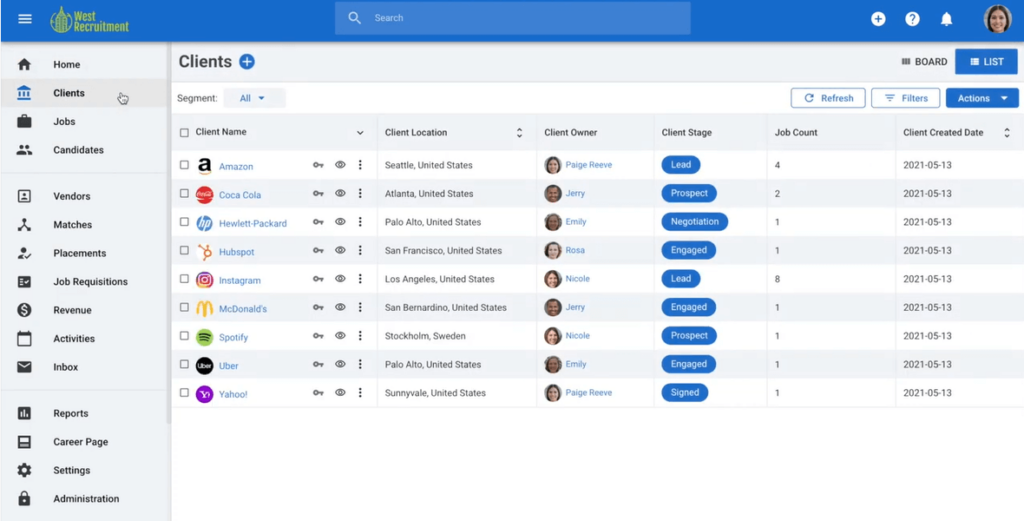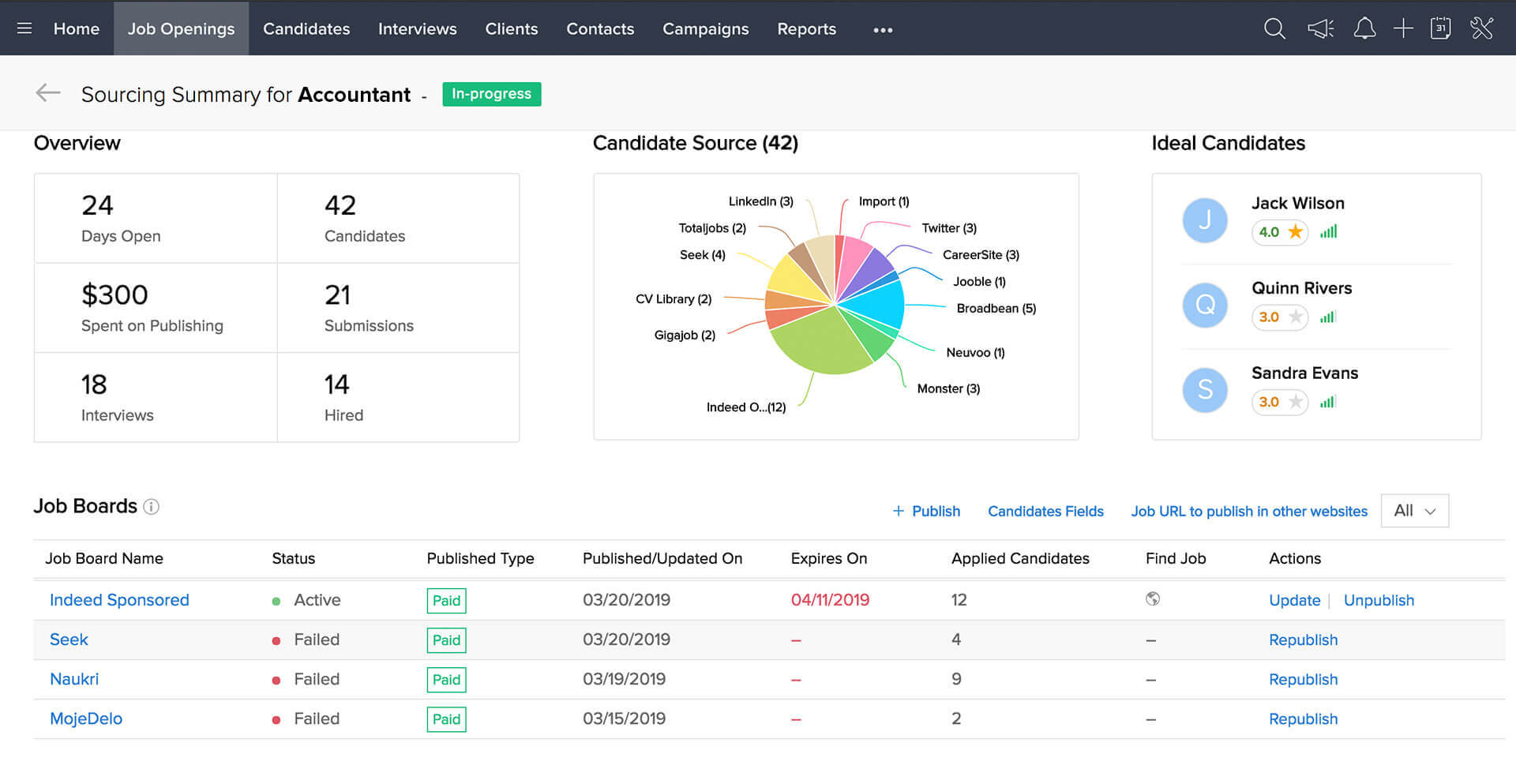Dive into the world of recruitment CRM systems and discover how they can revolutionize your hiring process. These powerful tools empower recruiters to streamline their workflows, automate tasks, and make data-driven decisions, transforming the way you attract, engage, and hire top talent.
With recruitment CRM systems, you’ll gain a comprehensive solution that seamlessly integrates with your existing HR and recruiting tools, providing a centralized platform for all your hiring needs.
Overview of Recruitment CRM Systems

Recruitment CRM (Customer Relationship Management) systems are specifically designed software applications that streamline and enhance the recruitment process for organizations. These systems provide a centralized platform to manage candidate data, track recruitment activities, and automate various tasks, enabling recruiters to work more efficiently and effectively.
Benefits and Advantages of Using a Recruitment CRM System
Implementing a recruitment CRM system offers numerous benefits to organizations, including:
- Improved Candidate Management:Centralizes candidate information, allowing recruiters to easily track candidates throughout the recruitment lifecycle, from sourcing to hiring.
- Streamlined Recruitment Process:Automates repetitive tasks, such as scheduling interviews, sending emails, and tracking candidate progress, freeing up recruiters’ time for more strategic activities.
- Enhanced Collaboration:Facilitates seamless collaboration between recruiters, hiring managers, and other stakeholders, ensuring everyone has access to the latest candidate information.
- Improved Candidate Experience:Offers a seamless and personalized candidate experience, keeping candidates informed and engaged throughout the recruitment process.
li> Data-Driven Decision-Making:Provides detailed analytics and reporting capabilities, enabling recruiters to make informed decisions based on data and identify areas for improvement.
Key Features and Functionality
Recruitment CRM systems offer a comprehensive suite of features that streamline and enhance the recruitment process. These features empower recruiters to manage their entire hiring workflow efficiently, from sourcing candidates to onboarding new hires.
Let’s explore the essential features and how they contribute to the recruitment process:
Candidate Relationship Management (CRM)
CRM capabilities enable recruiters to centralize candidate information, track interactions, and nurture relationships throughout the recruitment cycle. This allows for personalized communication, targeted outreach, and improved candidate engagement.
Job Posting Management
Recruitment CRM systems provide tools to create, publish, and manage job postings across multiple channels. They streamline the process of posting jobs, collecting applications, and tracking the progress of candidates.
Candidate Sourcing
These systems integrate with various candidate databases and social media platforms, allowing recruiters to expand their candidate pool and identify top talent. Advanced search and filtering capabilities help recruiters refine their searches and find the most suitable candidates.
Pipeline Management
Recruitment CRM systems provide a visual representation of the recruitment pipeline, tracking the progress of candidates through each stage of the hiring process. This allows recruiters to identify bottlenecks, optimize their workflow, and ensure timely hiring.
Interview Scheduling
Integrated scheduling tools enable recruiters to coordinate interviews with candidates and hiring managers. Automated reminders and notifications help ensure timely scheduling and reduce the risk of missed appointments.
Offer Management
Recruitment CRM systems facilitate the creation and management of job offers. They provide templates for customizing offers, tracking candidate responses, and automating follow-up processes.
Onboarding
Some recruitment CRM systems offer onboarding modules that help streamline the onboarding process for new hires. They provide tools for document management, task tracking, and communication, ensuring a smooth transition into the organization.
Implementation and Integration

Implementing a recruitment CRM system involves careful planning, collaboration, and integration with existing HR and recruiting tools. This section Artikels the process, key steps, and best practices for successful implementation.
The implementation process typically begins with defining project goals, establishing a project team, and gathering requirements from stakeholders. The system is then configured, customized, and integrated with relevant HR and recruiting tools. Data migration, user training, and ongoing support are also essential aspects of the implementation process.
Integration with Existing Systems
Integrating the recruitment CRM system with existing HR and recruiting tools ensures seamless data flow and enhances overall efficiency. This integration allows for:
- Automated data synchronization between systems, reducing manual data entry and errors.
- Centralized access to candidate and employee information, providing a comprehensive view of talent data.
- Streamlined workflows and improved collaboration among recruiting and HR teams.
Data Management and Reporting
Effective data management is crucial for successful recruitment. A robust CRM system centralizes candidate information, streamlining data collection and analysis. It captures data from various sources, such as job boards, applicant tracking systems, and social media, providing a comprehensive view of the recruitment process.
The types of data collected include candidate profiles, resumes, interview notes, and feedback. This data is used to:
- Identify and qualify candidates
- Track candidate progress through the hiring process
- Analyze recruitment metrics and identify areas for improvement
Reporting Capabilities
A CRM system provides robust reporting capabilities that offer insights into the recruitment process. These reports can be customized to meet specific needs and provide data on:
- Time-to-fill
- Candidate source effectiveness
- Hiring manager satisfaction
- Diversity and inclusion metrics
By analyzing these reports, recruiters can identify bottlenecks, optimize hiring strategies, and improve the overall efficiency of the recruitment process.
Vendor Selection and Evaluation
Selecting the right recruitment CRM system vendor is crucial for a successful implementation. Here are some key criteria to consider when evaluating vendors:
Functionality:Ensure the system meets your specific recruitment needs, including candidate management, job posting, and analytics.
Integration:Determine how easily the system integrates with your existing HR systems, such as applicant tracking systems (ATS) and human capital management (HCM) software.
Scalability:Consider the size of your organization and future growth plans to ensure the system can handle your current and future needs.
Security:Evaluate the vendor’s security measures to protect sensitive candidate and company data.
Customer Support:Assess the vendor’s level of support, including response times, availability, and technical expertise.
Factors to Consider
- Industry Expertise:Vendors with experience in your industry may provide tailored solutions.
- Reputation and References:Check online reviews and request references from current customers.
- Cost and Pricing:Determine the vendor’s pricing model and ensure it aligns with your budget.
- Implementation Timeframe:Consider the time it will take to implement the system and how it will impact your recruitment operations.
Best Practices for Vendor Evaluation and Selection, Recruitment crm system
- Create a Vendor Evaluation Checklist:Artikel the key criteria and factors to consider.
- Request Vendor Demos and Presentations:Get a firsthand look at the system and its capabilities.
- Conduct Reference Checks:Contact existing customers to gather feedback on the vendor’s performance.
- Negotiate a Service Level Agreement (SLA):Define the vendor’s responsibilities and performance expectations.
- Consider a Pilot Project:Test the system in a small-scale environment before making a full commitment.
Emerging Trends and Innovations
The recruitment CRM landscape is constantly evolving, driven by technological advancements and changing industry needs. Emerging trends are shaping the future of recruitment CRM, introducing innovative features and technologies that are transforming the way organizations attract, engage, and manage candidates.
One key trend is the rise of artificial intelligence (AI) and machine learning (ML) in recruitment CRM. AI-powered tools can automate repetitive tasks, such as screening resumes, scheduling interviews, and providing personalized candidate recommendations. ML algorithms can analyze large volumes of data to identify patterns and predict candidate behavior, enabling recruiters to make more informed decisions.
Candidate Relationship Management (CRM)
Candidate Relationship Management (CRM) is a growing trend in recruitment CRM. It focuses on building and maintaining long-term relationships with candidates, even those who are not immediately hired. By nurturing these relationships, organizations can create a pool of qualified candidates for future openings and build a strong employer brand.
Data-Driven Recruitment
Data-driven recruitment is another emerging trend. Recruitment CRM systems are increasingly providing robust data analytics capabilities, allowing recruiters to track key metrics, such as time-to-hire, candidate engagement, and diversity metrics. This data can be used to identify areas for improvement and make evidence-based decisions about recruitment strategies.
Mobile-First Design
With the increasing use of smartphones and tablets, mobile-first design is becoming essential for recruitment CRM systems. Candidates expect to be able to access and interact with recruitment tools from any device, anytime, anywhere. Mobile-friendly CRM systems make it easier for recruiters to stay connected with candidates and manage the recruitment process on the go.
These emerging trends and innovations are transforming the recruitment CRM landscape. By embracing these advancements, organizations can improve their recruitment efficiency, enhance candidate experience, and gain a competitive edge in the war for talent.
Closing Notes

In the ever-evolving recruitment landscape, recruitment CRM systems stand out as indispensable tools. By embracing these innovative solutions, you’ll not only enhance your hiring efficiency but also gain a competitive edge in attracting and retaining the best talent. As the industry continues to evolve, these systems will undoubtedly play an even more pivotal role in shaping the future of recruitment.
 Lingkupruang.biz.id The Ultimate Guide to CRM Mastery
Lingkupruang.biz.id The Ultimate Guide to CRM Mastery